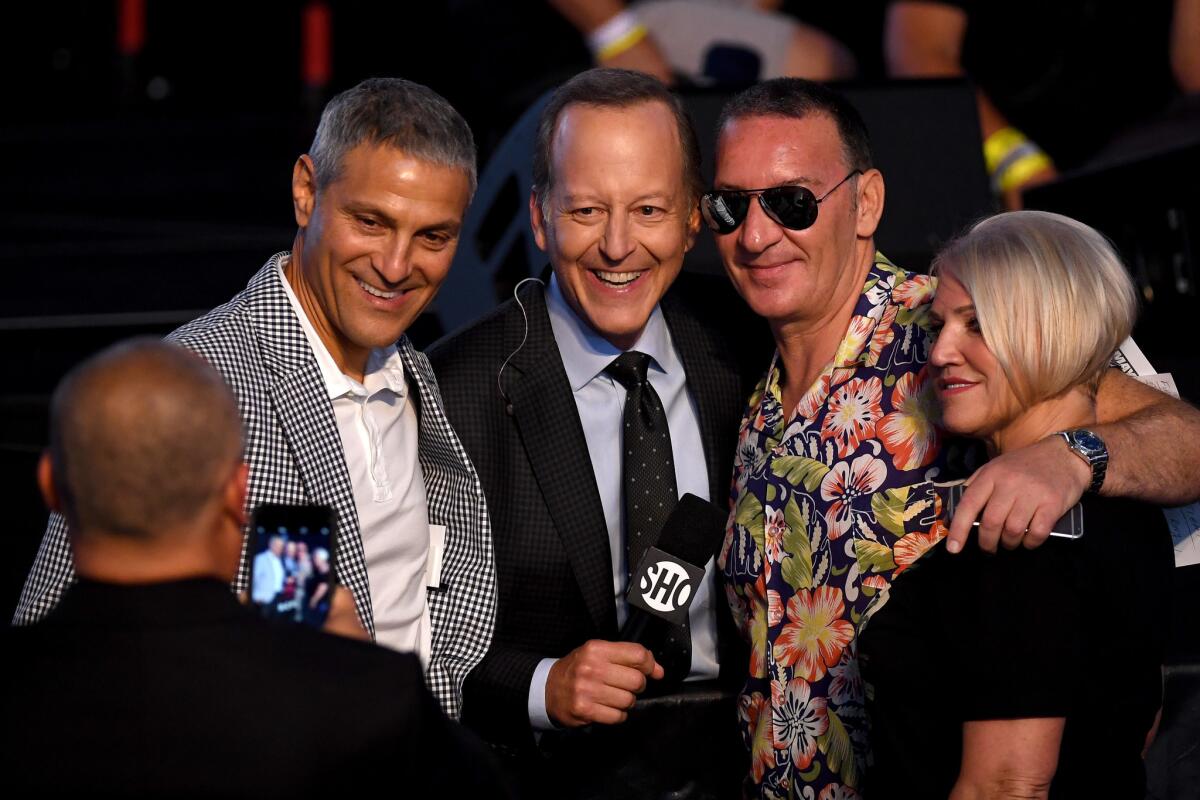After a rough 2019, Hollywood’s talent agencies brace for more uncertainty

Few entertainment industry archetypes have remained as consistently recognizable as that of the brash Hollywood talent agent.
For recent film school graduates, joining the ranks of young deal-chasers was an entry point for those who wanted to get into show business yet preferred a steady income to the fragile existence of production assistants and budding writers.
But 2019 may have been the year that shattered any illusion of stability in the talent representation field.
An ongoing dispute over industry practices between the biggest talent firms and the Writers Guild of America devolved into an apparent quagmire, depriving agencies of commissions and fees they’ve long relied on, with no exit strategy in sight. Agencies’ continued attempts to diversify into other businesses, including financing film and TV productions, had mixed results. Even the industry’s most famous power player, Ari Emanuel, suffered a massive setback when his Beverly Hills-based empire, Endeavor, scrapped plans to go public in response to a choppy market and broader skepticism of the company’s strategy.
In another surprise, ICM Partners, which for years had set itself apart from rivals by avoiding outside financing, raised eyebrows by agreeing to sell about a third of its business to New York investment firm Crestview Partners for roughly $150 million. Since buying its independence from an outside investor in 2012, ICM was seen as the last holdout among the major agencies, steadfastly sticking to its traditional business of representing actors, writers and directors.
The shift underscores the growing pressure agencies are under to scale up and adapt to a changing media industry. The rise of streaming and the expected decline of TV packaging — where agencies collect fees for packaging talent on shows — combined with the effects of the longstanding writers boycott, have squeezed talent agencies, some of which have weathered high-level executive turnover, laid off workers and cut back on overtime pay for assistants.
“If you’re an agency today, you need to think pretty hard about what the future of the business is,” said Keyvan Peymani, a managing director at the Los Angeles-based investment firm Salem Partners and a former executive at ICM Partners and Warner Bros. “There needs to be some ammunition in the coffers for you to figure out how to capitalize on the future of the business. The entertainment business is becoming more global in many different ways, and the agency business is no different.”

One could be excused for thinking that the rise of streaming and the accompanying bidding wars for talent would mean riches for the agencies. In reality, the digital revolution has been a mixed blessing. Yes, the growth of big-spending services like Netflix and Amazon Prime Video has driven up the prices for new projects and increased demand for older, popular TV series like “Friends” while providing a new outlet for lower-budget films. However, the changes have radically altered the way agencies earn money.
For example, the collapse of the syndication market in television has resulted in less back-end profit, a lucrative source of income. Companies like Netflix and Disney are increasingly buying out talent’s back-end participation in favor of upfront fees, which limits an agency’s profit if a show becomes a runaway success.
“These are wholesale shifts in the agency business, and the agencies have been very cognizant of the underpinnings of their revenue,” added Peymani.
To adapt to an increasingly online — and global — market, agencies are using acquisitions to expand their footprints in talent representation and spread into other industries, reducing their dependence on the fickle talent business. They have invested in such growing areas as e-sports, podcasts and live events. Agencies have also focused on analyzing audience data to help their clients find new opportunities.
Beverly Hills-based Endeavor Group Holdings recently bought a majority stake in the New York-based hospitality and live events business On Location Experiences in a deal worth $660 million.
In July, a division of the Creative Artists Agency bought the Base Soccer Agency, a London-based firm that represents soccer players, coaches and managers. Last year, United Talent Agency acquired Digital Brand Architects, a West Hollywood-based firm that manages prominent digital influencers, and invested in the sports agency Klutch Sports Group. UTA also pursued the Paradigm Talent Agency last year, but was rebuffed.
UTA Chief Executive Jeremy Zimmer said his Beverly Hills-based company wants to further expand its sports and music businesses.
“Any additional acquisition or expansion has to be strategic for our clients and provide something meaningful for them in how we develop their careers,” Zimmer said.
ValueAct Capital Chief Executive Jeff Ubben, who owns roughly 5% of UTA, sees a big opportunity to develop brands around agency clients.
“The idea of surrounding the talent and having ancillary revenues and investing behind that is kind of the next phase of what we do,” he said.
Other agency investors also are bullish on the industry. “Talent agencies offer a way for private equity to invest... [in] the increasing demand for content, without taking the hit and creative risks that often come with production companies,” said Brian Cassidy, head of media at Crestview Partners.
ICM Partners is hoping to use its private equity backing to make acquisitions abroad, including potentially acquiring the British live music booking agency Primary Talent International, according to a person familiar with the matter who was not authorized to comment. The agency said revenues reached a record last year, but declined to disclose its finances.
“Much like Netflix, we do look at it as a worldwide business,” said Kevin Crotty, co-president of ICM Partners. “That’s where this is all going.”
Still, while diversifying and achieving global scale sounds good in an investor pitch meeting, last year showed just how risky it can be for agencies to stray from their roots.
The launch of affiliated production companies by agencies — namely Endeavor Content, CAA’s Wiip and UTA’s joint venture Civic Center Media — is a major source of friction with the Writers Guild of America, which views such entities as prone to conflicts of interest. Agencies maintain that they can manage conflicts and that their investments create new opportunities for their clients.
WME owner Endeavor, backed by private equity, didn’t just expand into financing productions, like the TV series “Killing Eve.” It also took on heavy debt to acquire companies, including the talent firm IMG and the mixed martial arts league UFC. A long-anticipated initial public offering was intended to help pay down some of that debt and deliver a return for its investors by raising as much as $600 million, valuing the company at $8 billion. Emanuel’s goal was to build a global entertainment company that would help it retain and expand its roster of talent.
But Endeavor scrapped its IPO plans, citing adverse market conditions after the rocky public listing of exercise bike seller Peloton Interactive Inc. and controversies surrounding the office-sharing company WeWork. To observers, the sudden retreat also underlined persistent questions about Endeavor’s business.
Analysts said Endeavor also struggled to show potential investors how its disparate businesses fit together. What exactly does owning UFC or the Professional Bull Riders have to do with running a talent business? Further, the agency’s representation business is a tough sell for Wall Street because revenues are volatile and depend on the whims of talent.
“Representation is one of those businesses that is not predictable,” Peymani said. “That isn’t a great proposition for a public business.”
Endeavor was unprofitable in the first quarter of 2019, with a net loss of $152.6 million, compared to a net loss of roughly $147 million a year earlier, according to filings with the U.S. Securities and Exchange Commission. Revenue during that same period increased 40%, to $1 billion.
Silver Lake Partners, a major investor in Endeavor, declined to comment.
The decision to pull the IPO made some agents unhappy, because people had taken very small or no bonuses in the last couple years in anticipation of the public offering, according to a person who is close to the parties involved who was not authorized to comment.
Endeavor, which hasn’t ruled out a future offering, has defended its decision.
People close to Endeavor said no agents had left as a result of the IPO pullback and that agents were given an opportunity to liquidate some of their equity.
“We made the prudent and correct decision to pull back and look at doing this another time when market conditions for IPOs are better,” said the person, who was not authorized to speak publicly. “Everyone was disappointed, but I don’t think anyone felt like it was the wrong decision. We’re moving on and live to fight another day. We’ll see what happens next year.”
After a topsy-turvy 2019, there’s little indication that the new year will bring much relief.
There appears to be no end in sight for the writers boycott, which began in April when thousands of writers fired their agents over packaging fees and affiliated production. The agencies and the Writers Guild are also engaged in a court battle over the practices that could last years. Three large agencies — CAA, UTA and WME — have sued the WGA, accusing the guild of violating anti-trust laws. The WGA recently lost its effort to toss an agency lawsuit against the union.
The dispute has had a noticeable effect on the representation business, said Tom Nunan, a former network and studio executive who teaches at the UCLA School of Theater, Film and Television.
“There’s no question that this dispute is creating all sorts of havoc within the agencies, and they’re having to rethink their business models,” Nunan said.
Further, the September reelection of David Goodman as president of the Writers Guild of America West emboldened the union’s leadership to dig in its heels.
As pressure mounted, more than 80 smaller and midtier agencies signed individual agreements with the WGA, rather than try to carry on without their writer clients.
Larger firms say they have yet to experience any adverse financial effect because they are still benefiting from multi-year agreements involving writers and are continuing to package shows around intellectual property such as popular books, podcasts and foreign-language show adaptations. Still, one industry insider acknowledged that the number of writer clients may decline.
Meanwhile, studios and writers are figuring out how to collaborate without agents, instead using lawyers, managers and old school networking as a temporary, imperfect workaround. Adding to the uncertainty, some industry observers believe Hollywood writers could go on strike later this year if the WGA can’t reach a deal on a new contract with the studios.
“The more time that goes on, the less power and leverage the agencies have, because writers are discovering that life goes on,” Nunan said. “The wheels of the industry have continued to turn.”
Times staff writer Stacy Perman contributed to this report.
More to Read
Inside the business of entertainment
The Wide Shot brings you news, analysis and insights on everything from streaming wars to production — and what it all means for the future.
You may occasionally receive promotional content from the Los Angeles Times.












